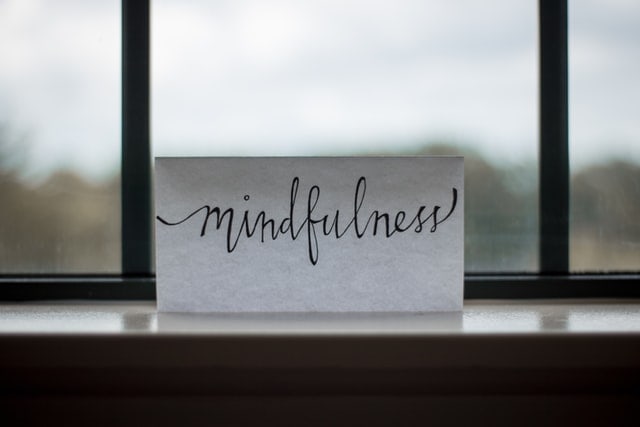Meditation has been seeing a fast-growing popularity for the last couple of decades. This ancient practice has established itself as a system that supports and strengthens your mental health and general well-being. Numerous studies and research over the last few decades have proven the benefits of mindfulness meditation and it is now well accepted in the fields of science and medicine.

What is mindfulness meditation?
Mindfulness meditation is a form of meditation that helps you to focus on the present and to become aware of your mental and emotional processes. It allows you to be in the present without any form of attachment or judgment to negative thoughts, thereby calming the mind and body. The many benefits of mindfulness meditation come from this focus, which instils a sense of gratitude that is mentally and physically invigorating.
Almost all of us are guilty of excessive rumination about the past or anxiety about the future. When we aren’t mindful, our reactions tend to be conditioned and usually negative. Mindfulness allows you to step back and positively analyse your emotions, empowering you to deal with them better. With consistent and dedicated practice, your mental processes become more focused and you can feel the benefits of mindfulness meditation for the rest of your day.
Mindfulness meditation teaches you how to root yourself in the present moment and redirect your energies to the now. It helps you learn how to just breathe and let go of everything for some time to focus on yourself and your thoughts.

Mindfulness meditation is not a part of any religion and is open for anyone to do. Whether you’re a beginner or an expert, you can access the benefits of mindfulness meditation and improve your day.
Meditation is a mental practice to calm the mind and relax the body. It is simple and yet surprisingly powerful. Contrary to popular belief, meditation does not require you to dedicate hours of your days to learning it. You do not need to make any drastic changes to your lifestyle or diet to experience the benefits of mindfulness meditation. All it requires is that you set aside a few minutes of the day to disconnect from the world and reconnect with yourself.
Mindfulness meditation and your professional life
Our lives have become more complex, chaotic and busy over the last few decades. The list of things we need to accomplish in our day seems to go on, and we push the limits of our productivity every day. This takes an incredible toll on our physical well-being and our mental health, although it may take a long time to see this.
One of the greatest benefits of mindfulness meditation is that it teaches you how to focus and be present in the moment. Whether you choose to multitask at work (most jobs require this) or if you need to achieve a state of deep focus (surgeons, pilots, etc.), mindfulness will help you achieve one task at a time without panic or stress.

It also helps you release stress and reduce anxiety daily. The harmful effects of stress are well known and there are many different stress management strategies you can use. But if you use meditation for nothing else than feeling more relaxed, it will be enough. After all, what is mindfulness meditation but a tool you use for your benefit?
Using mindfulness meditation boosts your productivity in the long term and improves the quality of your work. As you can knock off tasks from your list, your satisfaction levels with work will also increase. This is one of the primary reasons that the benefits of mindfulness meditation have been acknowledged and adopted by major corporations, sports teams, armies and several other organizations around the globe.
Mindfulness meditation and your health and general wellbeing
The benefits of mindfulness meditation on physical and mental health are well documented and have been shown to improve your wellbeing in the short- and long-term.
In the long run, mindfulness can help in regulating and managing chronic illness and diseases such as:
- Depression and long-term anxiety
- Fibromyalgia i.e. chronic unexplained pain
- Diabetes
- Certain cancers
- Hypertension
- Compromised immune functioning
- Irritable Bowel Syndrome
The reasons for these benefits of mindfulness meditation are various. As a practice, it enhances your relaxation response and activates the parasympathetic nervous system. This has a noticeable impact on your heart, digestion, blood, immunity, pain perception and sleep.

Mindfulness has also proven beneficial in the short term with these effects:
- Boosts grey matter by increasing the number of folds in the brain, thereby preventing age-related brain conditions
- Improving mental health by mitigating short-term stress and anxiety
- Strengthening areas of the brain related to thinking, perception, attention and learning allows you to achieve goals and objectives of daily life
- Enhancing creativity and working memory, thereby stimulating new ideas and solutions
Mindfulness meditation and bad habits
One of the less documented benefits of mindfulness meditation is that it may help you let go of habits that are upsetting your health. This doesn’t always happen, but those who enjoy meditation and go deeper into the practice, become less likely to continue with habits like smoking, excessive alcohol consumption, and eating junk food.
What is mindfulness meditation going to do for your health? As you become more aware of the body and its environment, you are less likely to maintain bad sleep habits or allow stress to build to unhealthy levels. You will enjoy creating a lifestyle that supports your meditation practice – sleeping, stretching, eating clean, and getting some exercise.
This makes it easier for you to give up your addictions or recover from them easily. It also prevents any form of relapse so that you can focus on getting your health back on track. When a destructive habit has taken root in you, the craving or stimulus leads to a pattern of behaviour. For example: smoking or stress eating. Mindfulness meditation makes you see this habit with awareness and clarity thereby making it easier to battle the urge.
Mindfulness meditation and your quality of life
Throughout your life, you adopt certain habits and practices to streamline your daily activities and make you more efficient. But a routine also forces you to run every day on autopilot, which means you do not have to think too hard about your daily activities. In this mental state, it’s easy to be unaware of your thoughts, feelings and perceptions, or to note the causes of unhappiness or frustration.
One of the larger benefits of mindfulness meditation is that helps you cultivate a deep awareness of yourself. You begin to see with more clarity and develop the ability to introspect or focus within. This helps you deal with things that are upsetting you or worrying you and helps you become more conscious of your emotions and thoughts. The most obvious impact you will begin to see is a higher degree of gratitude and contentment with your life as well as stronger relationships with your loved ones.

What is mindfulness meditation going to do for your emotional health? The many benefits of mindfulness meditation make it hard to argue against the positive impact of this practice on your daily life.
Benefits of Mindfulness
- Higher sense of self-awareness
- Improved emotional and mental health through regulation of emotions
- Higher levels of confidence by way of better understanding the self
- Improved levels of empathy and compassion lead to better relationships with those around
- A more resilient mind and an ability to stay present and remain unaffected by feelings and thoughts
All these effects have the potential to enhance the quality of your life as well as your social ties.
It is easy to allow your daily life to deteriorate as the chaos and pace of the modern world distracts and disturbs you. You might drift through life, not aware of all that you do and the way you interact with your loved ones. Might ignore uncomfortable emotions, thoughts and feelings that indicate to you what you need to change about your life. Take the people and the things in your life for granted. Over time, mindfulness allows you to focus better on all of these which eventually leads to higher levels of appreciation and satisfaction for your life.
Mindfulness meditation and other forms of meditation
Meditation is an umbrella term that encompasses all forms of practice dedicated to improving mental health by reducing excessive brain noise and activity. Understanding mindfulness requires an understanding of what is mindfulness meditation first.
Mindfulness is a type of meditation that focuses on your sensory perceptions and thoughts. It is based on observing the flow of your perceptions and thoughts without any effort to change or comprehend them.

As such, mindfulness meditation is not any of the following:
- Having an empty mind – instead, it is about cultivating a mind to observe thoughts and perceptions without any form of discernment or judgment
- A religious practice – instead it is a spiritual practice that you follow for yourself
- About achieving everlasting happiness – instead, it is a way of anchoring yourself to the moment and developing a stronger mind
How mindfulness meditation can help you achieve a state of flow
For many people – especially those in the creative arts – a state of flow is a precious thing. It helps them to achieve deep focus and direct all their mental energy towards a particular task. This is important to musicians, writers, artists, and other creative arts, but it is also helpful for anyone trying to get something done.

What is mindfulness meditation going to do for your state of flow? The practice of meditation makes it easier for you to learn how to go into a place of concentration and focus. It teaches you how to let go of distractions and direct your energies towards a single purpose. Entering a state of flow is easier when you can control your thoughts in this way.
When to be careful with mindfulness meditation
There are many benefits of mindfulness meditation even for those with mental health conditions. However, mindfulness meditation some may be difficult or upsetting for others.
Some people may experience the following negative side effects of mindfulness meditation:
- Overwhelming stress and feelings of anxiety
- A sense of disconnection with reality
- Unexplained sensations of fear
If you experience any of these reactions, it is best that you discontinue the practice immediately. These issues are more likely to present in those who are susceptible to psychosis or other forms of mental health conditions. If you have or think you have any mental health concerns, it is recommended that you consult your medical or mental health professional before beginning meditation.

When you are just starting with meditation, you should spend small amounts of time on the practice. Here are some tips to build a healthy practice of mindfulness meditation:
- Practice your meditation as long as it feels natural and comfortable. Do not force it or try to spend too long. Starting with 10-15 minutes is a good idea.
- Most of us will find it hard to put aside distractions when we meditate. Don’t worry about this. thoughts come across your mind, they are all part of you. Observe them and allow them to pass without judgement
- Do not be discouraged at any point in time, ensure daily practice (even if for a few minutes) and you will find that it gets easier and better over time the more you engage with the mind
As you practice more regularly and find that meditation is working for you, you’ll become mindful of your other daily activities too. Mindfulness will seep into the other aspects of your day – as you commute, for example – and allow you to have a better day.
Weaving mindfulness meditation into a daily practice
As with any other new skill that you’re trying to learn, you must begin slowly. Consider the following advice:
- Start with one or two short sessions in a day so that you don’t overwork yourself.
- Aim for 10-15 minutes per session so that you can begin to develop a level of comfort.
- Try to practice in a quiet room to begin with. The less distractions you have, the easier it will be to focus. As you develop the skill of mindfulness, you can venture out into open spaces like parks to enjoy the fresh air and greenery while you practice.
- Wear loose clothes and sit in an easy pose. If you are uncomfortable sitting cross-legged, sit on a chair instead. The most important thing is that your back is straight and your breathing is gentle and flowing.
- Once you develop confidence and feel like you can dive deeper into the practice, extend the duration of each session.
- Even if you are pressed for time, make time to practice meditation for five minutes every day. Some amount of meditation is better than no meditation at all
- If you need to take a day off from meditation, don’t worry about it. After all, what is mindfulness meditation but a tool to relax?
- Do not meditate for more than four or five sessions in a day.
Where to Start?
As you begin to enjoy your practice, you might like to go on mindfulness meditation retreats to give yourself extended periods of practice, as well as to take advantage of guided meditation sessions.
Have you found yourself wondering: Should I look for a meditation class near me or should I try at home? For many people, it is easier to learn in a class, but some people like to try it at home. It isn’t difficult to learn how to meditate but you will need to put in the time.

The long-term benefits of mindfulness meditation will be apparent to you once you learn the technique. As you become comfortable with sharpening your focus and drawing your attention inward, you can practice any place and any time of the day. Aim for a regular practice and you should start to see the benefits of mindfulness meditation soon.



